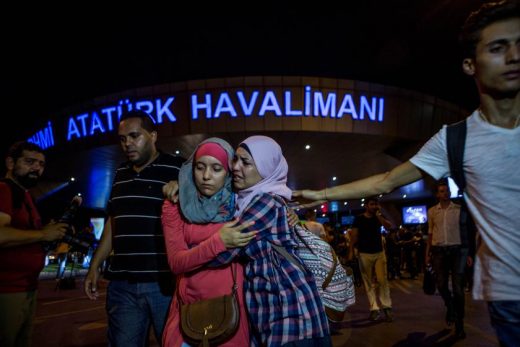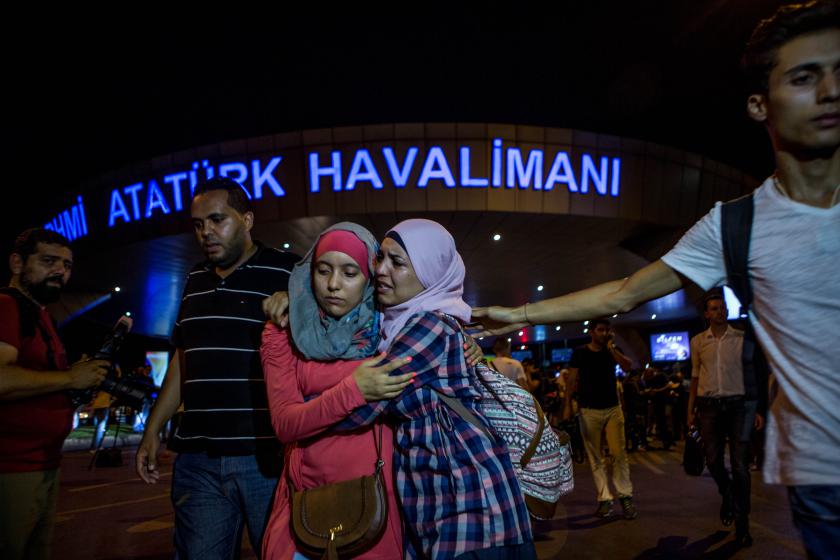These 4 Factors Help Explain Why Turkey Is Coming Under Increasing Terrorist Attack
These 4 Factors Help Explain Why Turkey Is Coming Under Increasing Terrorist Attack

Turkey was rocked on Tuesday night by yet another deadly terrorist attack. Officials say at least 36 people were killed and more than 150 wounded when three suicide attackers, armed with automatic weapons and explosives, unleashed carnage on those waiting at a security checkpoint to enter Europe’s third busiest airport.
The assault on travelers at Istanbul Atatürk Airport — named for Mustafa Kemal Atatürk, who founded the country as a secular republic — brings home how far down Turkey has been dragged from its former status as a regional exemplar of stability and a major tourist destination. Terrorist attacks have been rising across the country, with several targeting Istanbul—including a car bombing earlier this month that killed 11 people—bringing violence to a cosmopolitan city of 14 million that straddles the Bosphorus Strait and has historically been considered the meeting place of the European and Asian continents. Tourist arrivals are down by more than a third in the past year. How has it come to this?
1. The war in Syria
When the Syrian government brutally cracked down on the Arab Spring uprising in 2011, Turkey’s then Prime Minister Recep Tayyip Erdogan — now the president – was quick to call for Syrian President Bashar al-Assad to step down, comparing his regime to Nazi Germany. Syria’s bloody civil war has now been raging for more than five years, with a plethora of armed groups proliferating in the chaos. Turkey shares a 500-mile border with Syria — with attendant security headaches — and has been accused of allowing foreign fighters to cross over to join groups like the Islamic State of Iraq and Greater Syria (ISIS). There has been even more movement in the other direction: more than 2.5 million Syrians are now estimated to be living in Turkey.
2. Kurdish insurgency
Turkey’s role in Syria has been complicated by its own long-running battle with an insurgency waged by the Kurdish ethnic group who live across eastern Turkey and in parts of Syria, Iraq and Iran. The Turkish government claims Kurdish militants fighting ISIS are an extension of the Kurdistan Workers Party (PKK), which has been fighting for Kurdish autonomy since the 1970s. Turkey’s preoccupation with fighting Kurdish forces in Syria — including with airstrikes — puts it in conflict with both U.S.-allied Kurdish fighters and the Russian-backed Assad regime. Kurdish leaders say this in effect places Turkey on the same side as ISIS in the conflict.
3. ISIS
A rising number of terrorist attacks have been committed on Turkish soil in the past year, killing hundreds of people. The government blames some on a Kurdish rebel group, but — underlining the complex threat the country is facing — officials also believe ISIS is launching attacks. Authorities have already indicated they believe ISIS was behind Tuesday’s airport attack, which resembled the March attacks on Brussels airport that were linked back to the organization. Observers of the militant group say it has in the past chosen not to claim responsibility for attacks it has launched in Turkey.
4. Geopolitics
Tuesday’s attack in Istanbul came just days after Turkey announced it would normalize diplomatic ties with Israel, which had been ruptured since a 2010 incident when Turkish flotilla activists were killed by Israeli security forces while trying to break Israel’s aid blockade on the Gaza Strip. Apparently seeking to end isolation caused by its policy in Syria, Erdogan also signaled a thaw in relations with Russia this week by sending a letter of apology over a Russian warplane that Turkey shot down near the country’s border with Syria. Turkish commentator Mustafa Akyol tweeted after Tuesday’s attack that the timing of the airport attack “might not be an accident,” suggesting that it could be an ISIS response to the deal with Israel. Reports also say Turkey has recently carried out arrests and raids targeting ISIS at the border with Syria, which also could have sparked retaliation.
(17)



